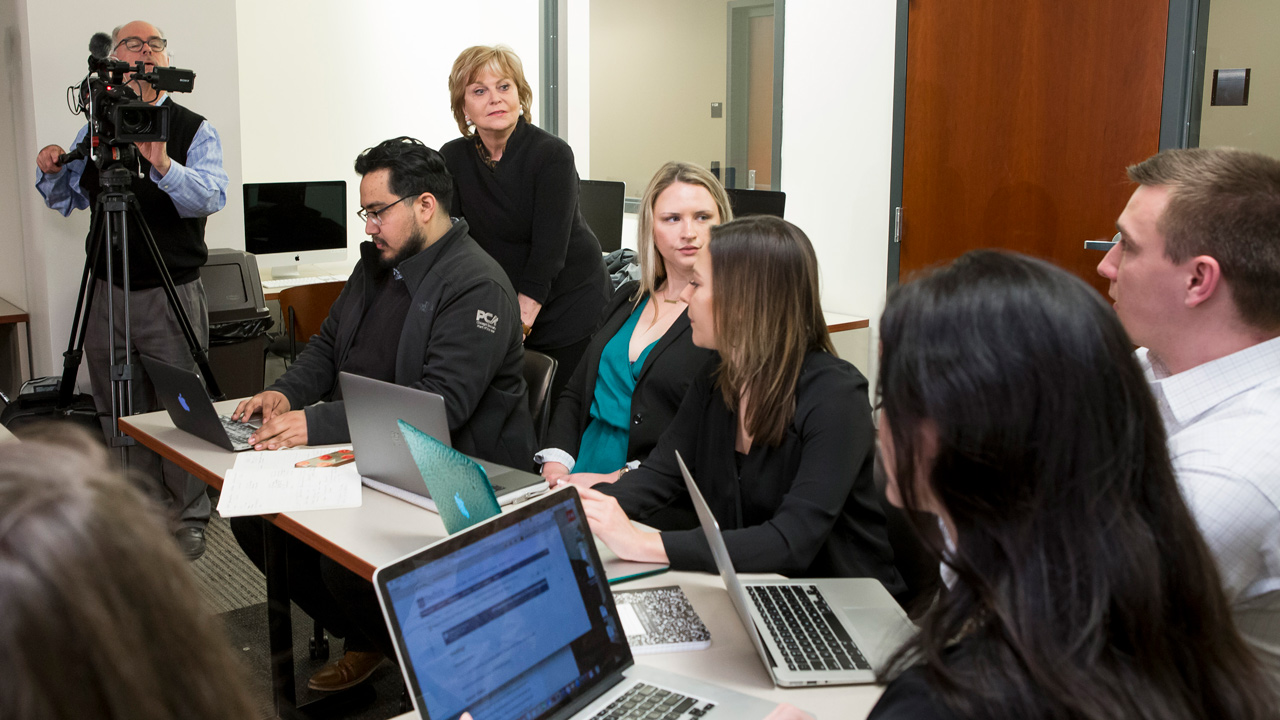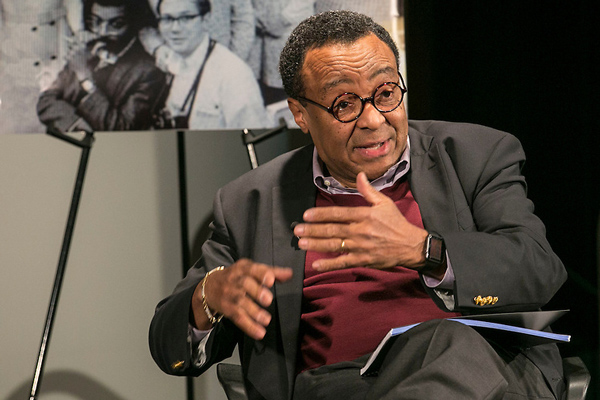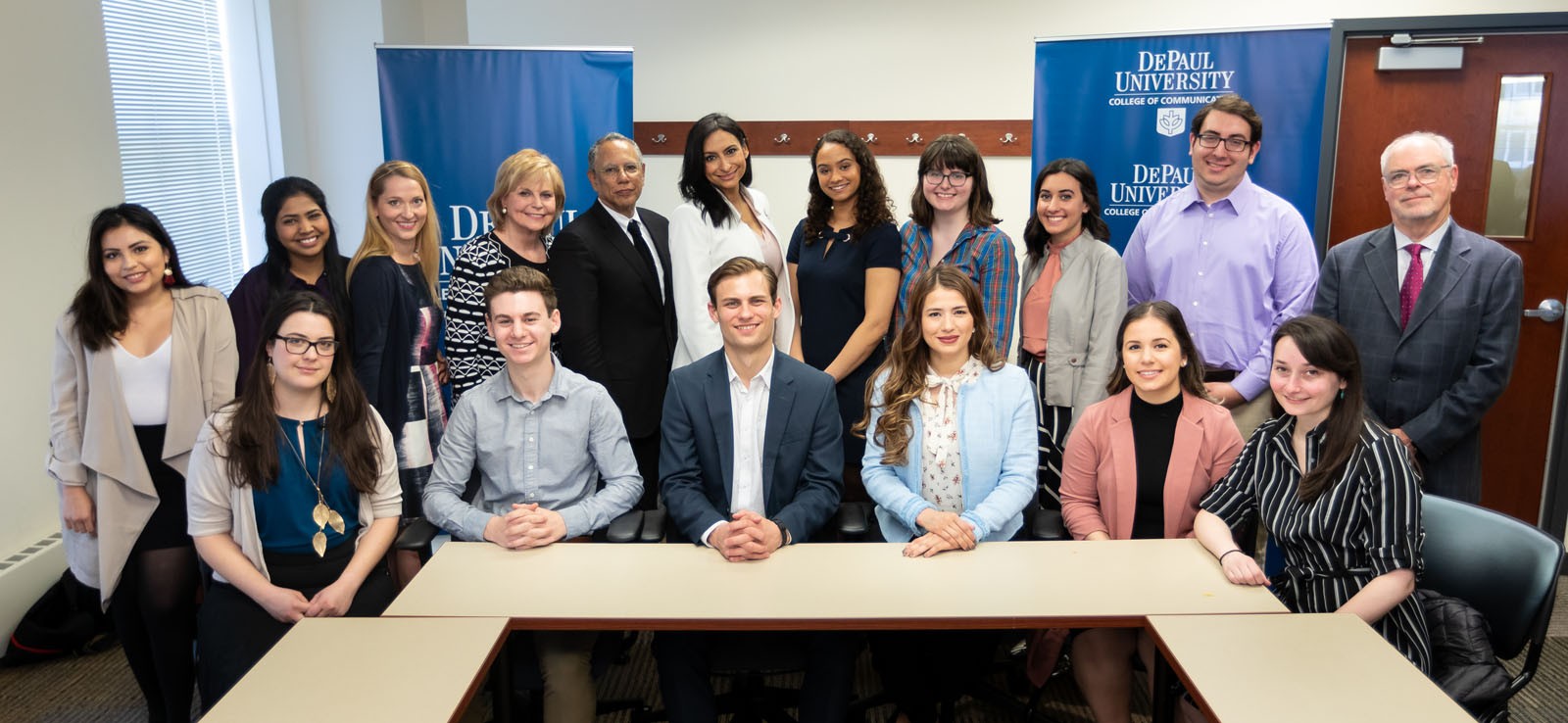 Don Moseley (far left) and Carol Marin work with students in their Advanced Reporting course. (DePaul University/Jeff Carrion)
Don Moseley (far left) and Carol Marin work with students in their Advanced Reporting course. (DePaul University/Jeff Carrion)
Everybody talks about the news, but nobody does anything about it.
While news may not be quite as universal as the weather, it certainly is on everyone’s minds—and not always in a flattering light.
In 2015, when talk of broadening the existing DePaul Documentary Project to become a center within the college’s
journalism program first began, “fake news was not really a term in the lexicon,” says veteran journalist
Carol Marin. Yet the college and former DePaul President and current Chancellor the Rev. Dennis H. Holtschneider, C.M., wanted to do something to fortify ethical journalism and burnish its reputation among an increasingly skeptical public.
Fr. Holtschneider said that he wanted students to know “that giving squabbling parties equal time is not the same as giving the public the truth.” With this principle in mind, the
Center for Journalism Integrity and Excellence (CJIE) emerged the following year with Marin and longtime television news producer
Don Moseley, who helmed the Documentary Project, as its co-directors. It has accomplished a lot in the span of only three academic years.
A thirst for reporting
Twenty-four students per year rotate through CJIE’s two-quarter intensive course. Marin and Moseley interview candidates suggested by other faculty in the journalism program. “The students come to us pretty much as fully formed reporters, producers or writers,” Moseley explains. They answer some questions in writing and then are interviewed. “It’s through that interview process that we accept them. The critical thing is that they have curiosity and dedication—they have to know that this is the job that they want,” he says.
 Past guest speakers of the CJIE include journalists such as Clarence Page of the Chicago Tribune. (DePaul University/Jeff Carrion)
Past guest speakers of the CJIE include journalists such as Clarence Page of the Chicago Tribune. (DePaul University/Jeff Carrion)Once they are accepted, students get classroom instruction in investigative journalism from Marin and Moseley. They have the opportunity to hear from and ask questions of accomplished
guest lecturers, who have included news anchor Jane Pauley and syndicated columnist Clarence Page.
They also get hands-on experience. “We’ve brought them to NBC, where they have worked on gubernatorial forums, mayoral forums, election night,” Marin says. “Some of them want to do the work we do, but they don’t spend time watching it and sometimes they don’t necessarily read it. They still have a view of journalism that needs bringing into careful focus. Part of what we try to do is shoot them into the real world.”
An important part of their real-world exposure is
developing news segments for the WTTW-TV public affairs program “Chicago Tonight.” “They have to come up with story pitches. Then they refine them and pick one story,” Marin, a regular contributor to “Chicago Tonight,” explains. “Then they start figuring out how to produce it. Who does what? Who do we interview? What are the issues? So they do it from conception, to research, to setting up the interviews, to shooting the interviews, doing all the B roll, writing and editing.” She adds, “With Don and me heavily fluttering around.”
Amplified impact
 Dean Baquet and Lourdes Duarte meet with journalism students, Carol Marin and Don Moseley before the 2019 Center Awards. (DePaul University/Jeff Carrion)
Dean Baquet and Lourdes Duarte meet with journalism students, Carol Marin and Don Moseley before the 2019 Center Awards. (DePaul University/Jeff Carrion)CJIE’s mission includes
honoring journalists whose work exemplifies integrity and excellence. In 2019, New York Times Executive Editor Dean Baquet received the Distinguished Journalist Award, and WGN-TV news anchor Lourdes Duarte (CMN ’99) was honored with the Distinguished Alumna Award. Previous recipients of the Distinguished Journalist Award are Lester Holt of “NBC Nightly News” and Jane Pauley of “CBS Sunday Morning.” Ben Welsh (CMN ’04), data desk editor for the Los Angeles Times, and Ann Pistone (CMN ’90), investigative producer for ABC7 Eyewitness News in Chicago, are past recipients of Distinguished Alumni awards.
Pointing to a wall of CJIE’s office, Marin says, “Over there in the red frame with the little statuette beside it is Ben Welsh’s first national award. Ben was our very first intern. He was the kid who was kind of always hungry, didn’t always make eye contact, but was eclectic and a great writer and thinker. He won his first Pulitzer just about three years ago.”
In 2018, the center launched its first
Freedom of Information Act (FOIA) Fellows program. The two-day program offers training and mentoring for early-career journalists who work at small news organizations. With a recent U.S. Supreme Court ruling that says federal agencies can deny FOIA requests for confidential data about their contractors, such training is more important than ever.
New in 2019 is the Visiting CJIE Fellow. The inaugural fellow, Dan Sinker, was the director of OpenNews, which “connects a network of developers, designers, journalists and editors to collaborate on open technologies and processes within journalism.” Marin says, “He teaches not just the students, but he teaches us because he’s the kind of digital thinker who has the ability to look at (social media), what it really is doing and how it can be manipulated.”
Mission-driven
Journalism has never been under the microscope more than it is right now. Thus, integrity in journalism has never been more important. “A huge component in virtually every class is they have to consider an ethical problem they might meet on the street. The kids love it the best,” Marin says.
"They go off, they graduate, they get a job, and Don and I—this has been true from the beginning—we get ‘9-1-1’ calls: ‘Oh, my God, my news director wants me to do something that I don’t think I should do. What should I do? Am I going to lose my job?’ So we remain an ethical sounding board for them after they’re gone.”
Behind everything is DePaul’s Vincentian mission. “You see it in the selection of stories our students have done for ‘Chicago Tonight.’ You see that mission. The inequity of marijuana sentencing, what happens to medical DACA students. Giving voice to the voiceless,” Moseley observes.
“DePaul is more than just a school,” Marin says. “It’s the atmosphere of a mission and responsibility and great work. We couldn’t be happier.”
Originally published in
Conversations (Fall 2019).